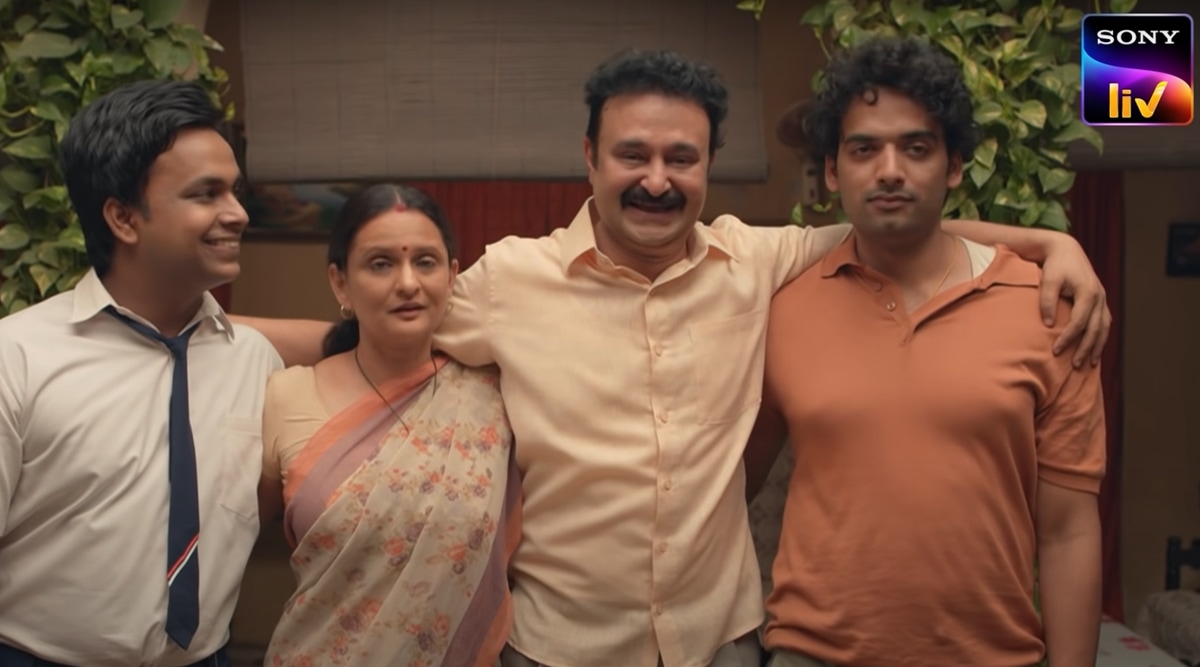 Gullak Season 2 is streaming on SonyLIV.
Gullak Season 2 is streaming on SonyLIV. The second season of Gullak, the TVF show streaming on SonyLIV, reunites us with the Mishra ‘parivaar’ — mummy Shanti (Gitanjali Kulkarni), papa Santosh (Jameel Khan), ‘bada beta’ Annu (Vaibhav Raj Gupta) and ‘chota beta’ Aman (Harsh Mayar), and their doings.
They are based in a small North Indian town, but it could be a middle-class family anywhere, trying to get by within their modest means while attempting to better their lot, with dollops of lived-in, quotidian feels: bickering and squabbling, but at the end of the day, solidly there for each other.
It’s this closeness, which comes through in unexpected ways, which makes this series such a heartwarming watch. Kulkarni barely ever addresses her family in saccharine tones; even the loving is doused in sarcasm. But those who know, are aware that the ‘jhunjhlaahat’ comes from a place of unshakeable love, equal parts exasperation and affection.
There’s also the constant desire to amp up their living standard, which sometimes leads the men of the house into dodgy zones, especially the older son who is still unemployed. Extra cash is tempting, but the straight-and-narrow is the only way to go: the Mishras are human, and fallible, but they know, and we know, that their moral centre is strong. Khan, who veers temporarily towards a ‘suvidha shulk’ (if you’ve heard a more genteel word for a bribe, do let me know) learns soon enough that the cost is higher than the benefit.
As in the first season, the all-seeing ‘gullak’ is the ‘sutradhar’ givings us the lowdown on all happenings, which revolve around nosy, nit-picking neighbours (Sunita Rajwar is a hoot), kindly kitty party aunties, local power-centres busy putting down people who think they deserve more, and relatives who deliberately sent wedding invitation cards without that all-important pre-fix, ‘sa-parivaar’.
There are times when you wish for a bit of variation in the cadences: does mummy, for example, have a gentler, softer tone? Can the constant carping stop, even for a second? But what’s nice is that Gullak never gets strident, even when some rather obvious lessons are being learnt, complete with appropriate ‘kahawats’. The men of the house never clear up after themselves, for example: do they really need mummy to point it out to them?
Or perhaps the Mishra men do. Nice to see them shame-faced after the always cooking-cleaning-washing mummy-machine mentions her aching knees, the effort a fresh green chutney takes to make, and why ‘sil-battas’ should give away to mixer-grinders. Kulkarni makes a wonderful pivot as the wife-and-mother who keeps everything going, nagging everyone with equal energy so that they can come up with their best. Khan’s ‘bijli-ka-board’ employee is as believable as he was last time around, and Mayar is spot-on as the younger son who hates studying, loves cricket, and still has the capacity to surprise his teachers and parents with great grades.
The Mishra household is not an island, even though most of the action is located within its walls. Watch out for the little jibe featuring that priceless phrase, ‘Nehru ki galti’: they never say so themselves, but left to themselves, the Mishras are the kind of salt-of-the-earth, upright Indians who will stand up for those being wronged. Grocery lists are important markers: a deo is as important as a new phone to an aspirational New Indian family. So are their roots, and moral values, which they get in ‘virasat’ from their mummy and papa.
When they return for a third round, which I’m sure they will sooner vs later, will the men have learnt to put away their used cups in the kitchen sink? Will Beta Annu have found a ‘naukri’? Most importantly, will the ‘gullak’ still occupy centre-stage?